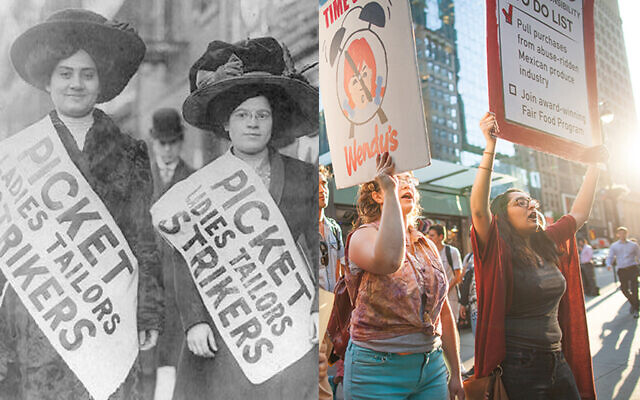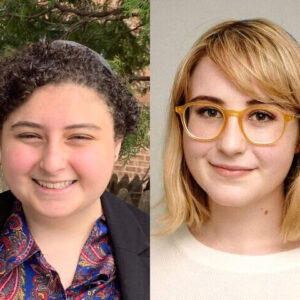Featured Image: Left: Women strikers on picket line during the “Uprising of the 20,000” garment workers strike, New York City, Feb. 1910 (George Grantham Bain Collection/Library of Congress). Right: Marchers demand Wendy’s support efforts to end human rights abuses in U.S. agriculture, July 2018. (Coalition of Immokalee Workers)
It was a chilly, drizzly evening in 2019. The weather did not seem to faze the hundreds of protesters who showed up in solidarity with the Coalition of Immokalee Workers — a farmworker led human rights group — in support of its call to boycott Wendy’s for labor abuses.
I arrived at the Midtown Manhattan protest with some classmates from NYU. After almost five miles of marching, we stopped to hear speeches. I spotted a few people carrying signs: “Jewish Culture for a Just World,” they read. “Jews for Labor Rights.”
I approached the group and learned that they were members of the Workers Circle, a 120-year-old Jewish social justice organization. Soon I was trading contact information with one of their organizers. Later, I’d have an informational interview, which would turn into an internship. Eventually, I’d find myself helping to build a network of college-aged Jewish activists. But at that moment, all I knew was the pride I felt to see fellow Jews at the protest, and that I wanted to stand alongside them.
Before the march, I was longing for purpose and direction in my activism. I googled “Jewish activist organization volunteer opportunities” over and over again to no avail. I found a lack of pathways for college-aged Jews like me to secularly engage with Judaism outside of Israel, to ground my social justice values in a proud, Jewish cultural context.
I dreamed of a community that encourages me to grapple with my role as a Jew in relation to class privilege, white supremacy and the youth-led protest movements of today. I knew I was not alone in these desires. Many young Jews want to engage in Jewish social justice work, authentically. It is out of these yearnings that the Workers Circle College Network was born.
The College Network connects progressive Jewish students in New York City and across the country to reflect and take action toward social justice. We began meeting in April, and have grown since then, adding another college organizer, Brit Zak, in September. We draw upon the Workers Circle’s unique history to inform our organizing.
At its founding 120 years ago, what was then known as the Workmen’s Circle (in Yiddish, Der Arbeter Ring) served as a mutual aid society, movement incubator and cultural space for newly immigrated Eastern European Jews, many of whom had backgrounds in the labor movement.
There were many notable union members and factory workers associated with the organization, but Clara Lemlich is perhaps the most noteworthy example. Then 19-year-old Lemlich worked in a shirtwaist factory. The majority of the workers were Italian and Jewish immigrant women, and these factories were notorious for their horrible hours, meagre pay and dangerous conditions.
In November 1909, Lemlich attended a union meeting of shirtwaist workers in Cooper Union in New York City, where they were deciding whether or not to strike for better working conditions.
For many hours, the men in attendance were the only ones speaking. They spent hours on stage, heavily cautioning against a general strike. Finally, as the story goes, a short woman stood up in the back of the room, and shouted “I have something to say!” Clara stormed the stage, and yelled to the audience, in Yiddish, “The time for talk is over: I call for a general strike!” The crowd erupted in loud cheers.
The co-founder of the Workers Circle, Benjamin Feigenbaum, was on the stage with Clara at that moment. He raised Clara’s right hand and administered a Yiddish oath in solidarity: “Should I turn traitor to my cause, may my arm wither and die from the arm I now raise.” The next day, thousands of shirtwaist workers walked out of their factories in protest.
We too want to be where the action is. We are serving as a hub for advocacy, ideas and culture for young Jews, just as the Workers Circle did then.
We are committed to social justice. As a network, we made dozens of calls to voters of color in Georgia and North Carolina with the Center for Common Ground, an organization that fights voter suppression. We also have an action team that helps network members meet with elected officials and advocate for progressive change. Recently, we met with Sen. Chuck Schumer’s staff and advocated for a comprehensive, immigrant-inclusive Covid-19 relief bill. We’ve also rallied for a Green New Deal and amplified the work of New York City mutual aid activists — particularly fitting given the Workers Circle’s beginnings as a mutual aid society.
But as another early 20th-century Jewish labor activist, Rose Schneiderman, once said, “The worker must have bread, but she must have roses, too.” Our regular discussion group is a great example of this model. We dive into topics of justice and equity while building camaraderie among our members. “Being able to be in specifically Jewish leftist space not only allows an interaction within my community that is exceedingly rare, but it also allows us to connect to a history that is commonly overlooked,” College Network member Yitzhak Ofrori-Solomon said.
Together we explore the ever-changing nature of the Jewish people. Yitzhak led the group in one such discussion, titled “Unpacking Ashkenormativity.” We aim to affirm the multi-racial diasporic reality of American Jews today: This coming January, Black Yiddish music specialist Anthony Russell will lead our members in a seminar series on Yiddish culture and anti-Racism.
The network has also held multiple cultural events. As a group, we reflected on the relevance of 100-year-old-literature when we held a table read of a 1908 Yiddish play about an abusive landlord, titled “Rent Strike.” We also held an online event called “Klezmer Jams” where network member Chloe Finder played Klezmer clarinet and taught the audience Yiddish tunes. During a time when members are physically separated from one another, our community has served as a source of connection to the past, and to each other.
We too want to be where the action is. We are serving as a hub for advocacy, ideas and culture for young Jews.
As young Jewish organizers, we are thrilled to be building a group like the College Network. For many of us, the Network has eased the sense of communal disconnect we had felt even before the pandemic and provided a pathway to engage in activism that feels authentic and wholly Jewish. We hope to continue sharing our ideas, laughter and passion for justice with others who have been searching for such a community.
If you too are a college student or know a college student who longs for a progressive Jewish community that centers these ideals, get in touch with us. You can follow our new College Network Instagram @workerscirclecollege or email us at college@circle.org.
This article originally appeared in The View From Campus, a project of the Jewish Week

